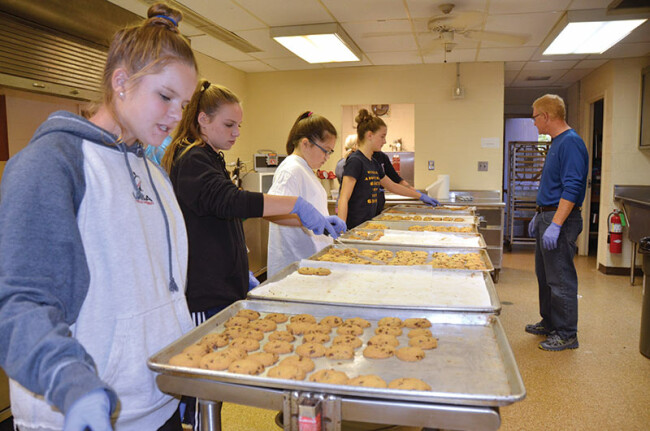Cookie Factory turns snacks into mission trips
By Erik Alsgaard
UMConnection Staff

Members of all ages at Calvary UMC in Annapolis make 827 dozen cookies. The monthly Cookie Factory raises funds for mission trips.
How do you turn chocolate chip cookies into a mission trip? At Calvary UMC in Annapolis, they’ve been doing it for 34 years.
On the first Saturday of the month during the school year, a small army of volunteers descends to the church’s kitchen, there to prepare and bake made-from-scratch chocolate chip cookies by the dozen. The Cookie Factory, as it’s called, makes lots of dozens of cookies. On this first Saturday in November, it’s 827 dozen. Or 9,924 cookies, plus a few
Each of the orders goes to a Naval Academy midshipman. It’s a small taste of home for young adults often far away from home.
Joan Moored is the Cookie Factory coordinator. For the past 10 or 15 years – she’s not exactly sure – she takes in all the orders from the parents and the parents’ clubs and enters it into the computer. The computer, she said, spits out an order form with the name of the person who placed the order and who it’s for. The computer also totals all the orders so she knows how many dozen cookies to make.
And in a well-used binder are the needed ingredients for making 827 dozen cookies. Or 1,000 dozen. Or 1,500 dozen. Pounds and pounds of butter, flour, chocolate chips, salt
This month, the order number is a little low. During February – Valentine’s Day – the order is often 1,200 to 1,500 dozen, “because everybody wants to send a Valentine,” Moored said.
“On ‘I-Day,’ we have a representative at the Naval Academy,” Moored said, “passing out order forms to parents.” She also sends out order forms to parents who placed orders the previous year. A lot of the information is shared via word of mouth, she said, and there’s a spot on the church’s website to place an order.
Each dozen costs $3.50, Moored said, which includes delivery. The money that is “profit” goes to the youth to pay for their mission trips throughout the year. Calvary typically sends 15 to 25 youth on mission trips in the summer, Moored said, and the Cookie Factory pays for them and their chaperones to go.
The money they raise also goes to support youth activities throughout the year, such as a winter relief dinner or angel tree shopping, said Sarah Lanzi who serves Calvary as its youth director while also attending Wesley Theological Seminary full-time.
“We support the local missions that our church, as a whole, takes part in,” she said. “The youth can take part without any costs to them.”
Lanzi has been with Calvary for 30
“It’s a crazy, elaborate process,” she said. “It’s organized chaos. The church supports us so well; we have adults who have been doing this forever, walking alongside the youth. It brings everybody together for a common purpose and a common goal.”
Joe Gryder, one of the volunteers at the Cookie Factory, experienced first-hand the power of receiving the cookies while at the Academy. He was a midshipman in the 90s who joined Calvary, in part, because of the cookie ministry.
“I’m from California,” Gryder said. “Cookies shipped from there take five days to get here. By the time they arrive, they’re all rock hard. What you get here are home-made cookies. I can go get store-bought soft cookies, but they’re not the same.”
Gryder also knows the human touch the cookies provide.
“The midshipmen are 17 and this is their first chance away from home,” he said. “The Navy protects them and keeps them safe, but there’s not the TLC that you need for the human soul coming from the Navy. This gives a little piece of that.”
The Cookie Factory is inter-generational. Helena Gryder is Joe’s sixth-grade daughter. She was a “flipper” on this day, taking the freshly baked cookies off the tray with a spatula and placing them on a cooling tray.
“I have a lot of fun here,” she said. “I like that everybody’s really, really nice and, no matter what, you’ll have a job to do.”
With an infectious smile, Helena Gryder knows the cookies are more than about just her fun.
“It’s really nice for the
The cookies aren’t just a reminder that someone back home loves them, Joe Gryder said, it’s also a way that the community affirms the midshipmen.
“It’s a piece of love from the community,” he said, “that says, ‘We’re glad you’re here; we’re thankful for what you do and we support you.’”
